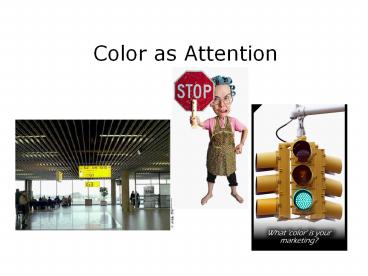Color as Attention - PowerPoint PPT Presentation
Title:
Color as Attention
Description:
Colors are different wavelengths (frequencies) of light. Only some colors occur as pure ... process reads the pixels in a region and computes color and intensity ... – PowerPoint PPT presentation
Number of Views:20
Avg rating:3.0/5.0
Title: Color as Attention
1
Color as Attention
2
Color
3
What is Color?
- Colors are different wavelengths (frequencies) of
light - Only some colors occur as pure wavelengths many
are mixtures of pure colors (e.g. white)
4
What is Color?
5
What is Color?
- We almost never see a pure wavelength of light
rather a mixture of wavelengths, each with a
different power - Only some colors occur as pure wavelengths many
are mixtures of pure colors (e.g. white)
6
How Do We See Color?
There are three kinds of cones in our retina S,
M, and L. They see Blue, Green, and Reddish
light.
Red cone
Green cone
Blue cone
7
EXAMPLE THE HUMAN EYE
8
THE HUMAN EYE RESPONSE
R(l)
b(l)
g(l)
r(l)
9
Color
The human eye can see 7,000,000 colors Yellow
is the most fatiguing color (reflectance) (Babies
cry more in yellow rooms)
10
How Color Cameras Work
- 1 CCD cameras
- A Bayer pattern is placed in front of the CCD
- A Demosaicing process reads the pixels in a
region and computes color and intensity
CCD - charge-coupled device
11
How Color Cameras Work
- 3 CCD camera use a beam splitter and 3 separate
CCDs - higher color fidelity
- needs lots of light
- requires careful alignment of ccds
12
Standard Linear Color Systems
- Several standards are used to define color
based on spectral response functions - CIE (Commission International dEclairage)
establishes standards - CIE XYZ is a popular standard with everywhere
positive response - RGB requires a negative (subtractive) component
in R response - YIQ, YUV
13
RGB Color System
RED
magenta
yellow
BLUE
GREEN
cyan
RGB
14
ANOTHER LINEAR SCHEME FOR REPRESENTING COLOR
- Invented for color television (NTSC)
- Backward compatible with B/W TV (Y val)
- Y given higher bandwidth than I/Q
YIQ (also YUV)
15
NONLINEAR SCHEMES FOR REPRESENTING COLOR
INTENSITY
red
magenta
saturation
yellow
hue
blue
green
cyan
HSI
16
Dividing Up Color Space
Hue
HSI is a nonlinear representation of color space.
Note the non-uniform treatment of color
Saturation
I (RGB)/3 or L .3 R .6G .1B
Intensity
S 1- 3 min(R,G,B)/I
x (R-G) (R-B)/((R-G)2 (R-B)(G-B))1/2
17
THE ORGANIZATION OF A 2D IMAGE
Pixel Binary 1 bit Grey 1 byte Color 3 bytes
18
Storing Images
- Non-lossy schemes
- pbm/pgm/ppm/pnm
- code for file type, size, number of bands, and
maximum brightness - tif (lossless and lossy versions)
- bmp
- gif (grayscale)
- Lossy schemes
- gif (color)
- jpg
- uses Y Cb Cr color representation subsamples the
color - Uses DCT on result
- Uses the fact the human system is less sensitive
to color than spatial detail
19
GIF IMAGE FORMAT
- GIF (Graphics Interchange Format)
- Limited to 8 bits/pixel for both color and
gray-scale.
20
TIFF IMAGE FORMAT
- TIFF (Tagged Image File Format)
- More general than GIF
- Allows 24 bits/pixel
- Supports 5 types of image compression including
- RLE (Run length encoding)
- LZW (Lempel-Ziv-Welch)
- JPEG (Joint Photographic Experts Group)











![⚡Read✔[PDF] Queer People of Color in Higher Education (Contemporary Perspectives on LGBTQ PowerPoint PPT Presentation](https://s3.amazonaws.com/images.powershow.com/10048447.th0.jpg?_=20240605108)



















